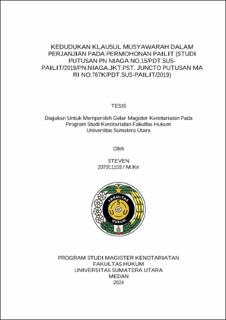| dc.contributor.advisor | Sunarmi | |
| dc.contributor.advisor | Sembiring, Rosnidar | |
| dc.contributor.advisor | Suhaidi | |
| dc.contributor.author | Steven, Steven | |
| dc.date.accessioned | 2024-10-31T08:22:56Z | |
| dc.date.available | 2024-10-31T08:22:56Z | |
| dc.date.issued | 2024 | |
| dc.identifier.uri | https://repositori.usu.ac.id/handle/123456789/98508 | |
| dc.description.abstract | CV.R filed for bankruptcy against PT.ATT at the Central Jakarta Commercial Court due to PT.ATT's failure to fulfill its payment obligations to CV.R (Commercial Court Decision No.15/Pdt.Sus-Pailit/2019/PN.Niaga.Jkt. Pst dated February 25, 2019, in conjunction with Supreme Court Decision No.767K/Pdt.Sus-Pailit/2019). The Commercial Court judge rejected the bankruptcy petition against the Bankrupt Respondent, as the Petitioners could not prove that a deliberation regarding the payment obligations of PT.ATI had taken place before the case in question. The Supreme Court judge, however, granted the bankruptcy petition against PT.ATI with all its legal consequences. The Central Jakarta Commercial Court judge was deemed to have wrongly applied the law by considering the existence of PT.ATI's debt to other creditors could not be simply proven by the absence of evidence that deliberation had been successfully conducted.
This research aims to determine the legal force of the dispute resolution clause through deliberation according to contract law, the position of the deliberation clause in bankruptcy petitions, and the reasons behind the Supreme Court Decision No.767K/Pdt.Sus-Pailit/2019 overturning the Commercial Court Decision No.15/PDT.SUS-PAILIT/2019/PN. NIAGA.JKT.PST.
This is a normative legal research that analyzes the law using a descriptive- analytical research approach, and the data obtained are analyzed qualitatively.
The results show that the legal force of the dispute resolution clause through deliberation is based on the provisions of Articles 1338, 1320, and 1340 of the Indonesian Civil Code. The deliberation clause in bankruptcy is not a condition for a bankruptcy petition to be granted or accepted by the judge. The judge is obliged to grant or accept a bankruptcy declaration petition if the conditions stipulated in Article 2 Paragraph 1 of the Bankruptcy Law and Article 8 Paragraph 4 of the Bankruptcy Law are met. The Supreme Court rejected the Commercial Court Decision No.15/PDT.SUS-PAILIT/2019/PN.NIAGA.JKT.PST because the bankruptcy petition filed by CV.R as the Cassation Petitioner met the provisions of Article 2 Paragraph 1 and Article 8 Paragraph 4 of the Bankruptcy Law, obligating the Supreme Court judge to grant or accept the bankruptcy declaration petition against PT.ATI. | en_US |
| dc.language.iso | id | en_US |
| dc.publisher | Universitas Sumatera Utara | en_US |
| dc.subject | Clause | en_US |
| dc.subject | Deliberation | en_US |
| dc.subject | Bankruptcy Petition | en_US |
| dc.title | Kedudukan Klausul Musyawarah Dalam Perjanjian Pada Permohonan Pailit (Studi Putusan PN Niaga No.15/PDT.SUSPAILIT/ 2019/PN.NIAGA.JKT.PST. Juncto Putusan MA RI No.767K/PDT.SUS-PAILIT/2019) | en_US |
| dc.title.alternative | Position of Deliberation Clause in Bankruptcy Petition Agreements (Case Study of Commercial Court Decision No. 15/PDT.SUS-PAILIT/2019/PN. NIAGA.JKT.PST. in Conjunction Within Supreme Court Decision No. 767K/PDT.SUS-PAILIT/2019) | en_US |
| dc.type | Thesis | en_US |
| dc.identifier.nim | NIM207011103 | |
| dc.identifier.nidn | NIDN0015026304 | |
| dc.identifier.nidn | NIDN0002026602 | |
| dc.identifier.nidn | NIDN0013076207 | |
| dc.identifier.kodeprodi | KODEPRODI74102#Kenotariatan | |
| dc.description.pages | 125 Pages | en_US |
| dc.description.type | Tesis Magister | en_US |
| dc.subject.sdgs | SDGs 16. Peace, Justice And Strong Institutions | en_US |


